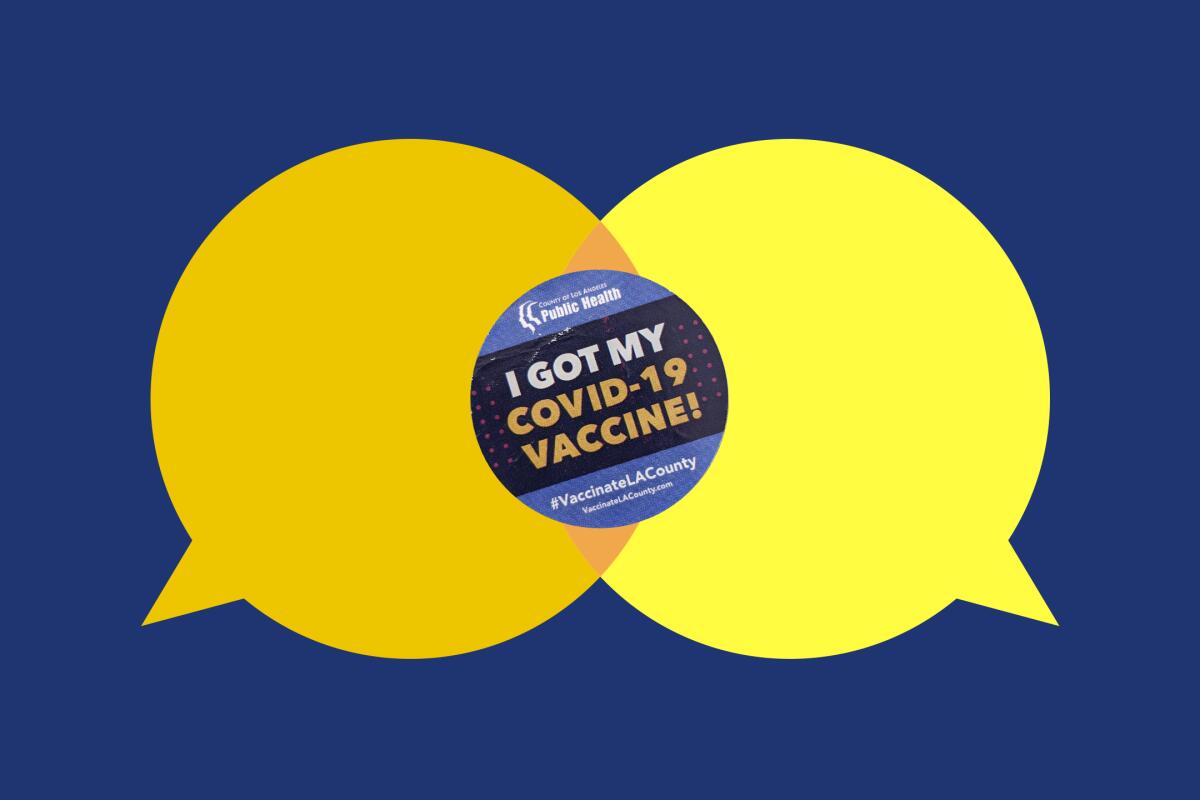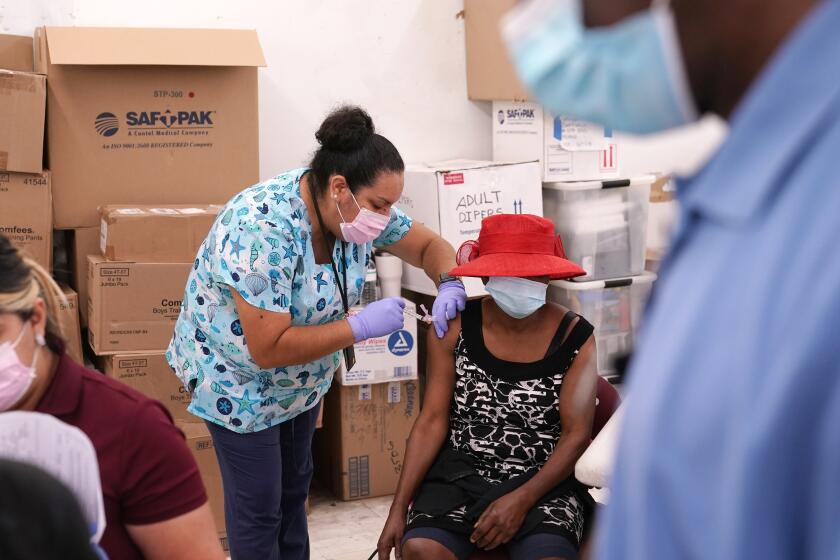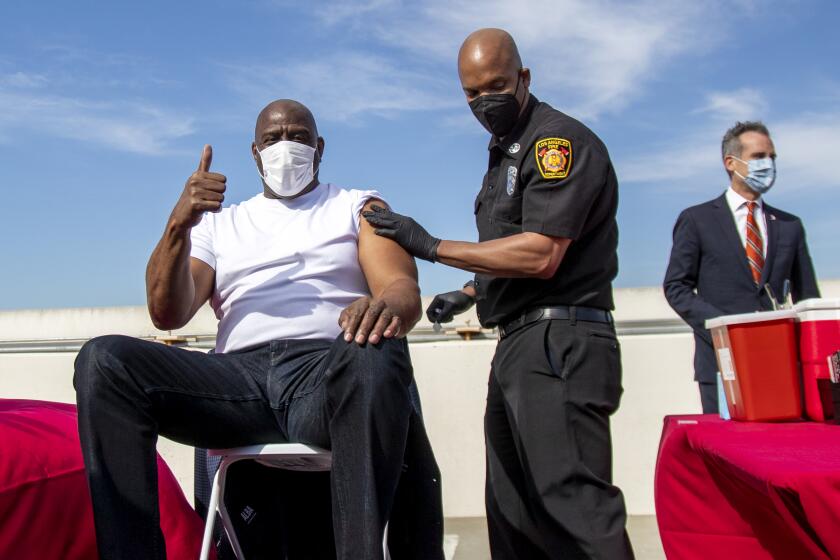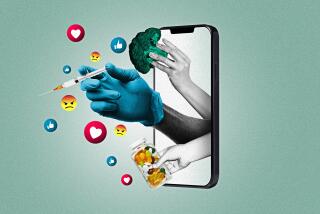How to convince someone to get the vaccine

- Share via
These are frustrating times. In the span of about a month, American society seemingly went from “we must reserve our precious doses of the vaccine for only the most in need” to “everyone go get one right now.” Today, you can walk into pharmacies and vaccination sites around L.A. and get jabbed in a matter of minutes without an appointment.
There’s a shot available for everyone who wants one. But what about the people who don’t?
If your friend, neighbor, coworker or loved one hasn’t gotten their COVID vaccine yet, they probably have a reason. Identifying that reason is key to getting them to get their shot, experts say.
If you want them to change their mind, you cannot approach the conversation as a debate in which, if your case is presented with sufficient evidence, your opponent loses and is sentenced to mandatory vaccination. You are having a discussion and trying to meet the other person where they are, understand their position, and talk with them (not at them!) about their concerns.
It has to come from a place of love, not hostility.
Fewer Americans are reluctant to get a COVID-19 vaccine than a few months ago, but questions about side effects and safety still hold some back.

“The first thing I would say is to listen first, not to tell them,” Dr. Chandra Ford, a professor of community health sciences at UCLA Fielding School of Public Health, told my colleague Thuc Nhi Nguyen. “We have to meet people where they are, so we have to actually hear where they are first.”
So Step One is listening. Ask: “Why aren’t you vaccinated?” Hear the person out. It’s fair to have concerns right now. The whole world changed in the last 15 months, then changed some more, then changed again. Saying “you’re being stupid, trust the science, just go get vaccinated already” is unlikely to be persuasive.
Laura Huang is a professor of business administration at Harvard Business School who studied how to change people’s minds while doing research for her book “Edge: Turning Adversity into Advantage.” She said her research showed that people who were most effective in persuading someone to come around to their point of view did so by recognizing the root of the disagreement and trying to overcome it before trying to change the person’s mind. Reservations are probably based in both logic (Is the vaccine really safe? How did they get made so quickly? How do we know what the long-term side effects are if it’s so new?) and emotion (fear, anxiety, frustration, anger). You need to enter the conversation prepared to address concerns on both fronts.
“The psychology of changing someone’s mind require a high level of emotional intelligence and logical thinking,” Huang said in an email. “When you come out the gate telling people they are incorrect about something they believe, this can come off as insulting and condescending, which often results in the other person losing interest in engaging with you productively.”
You need to determine which sources of information they trust. The global communications firm Edelman does an annual “trust barometer” to gauge where people are getting their information and which sources they trust. The places where you get your information are not going to be the same as everyone else’s.
Trust in media sources, the government, and non-governmental organizations fell globally, the report found.
“People have come to know and trust the information that they believe, and they don’t believe the sources that are coming from sort of the ‘other side,’” said Courtney Gray Haupt, who runs the U.S. healthcare team at Edelman.
In other words, if your friend doesn’t trust what he reads in newspapers, sending him an article about how safe and effective vaccines are will not be compelling.
So whom do people trust? Gray Haupt said the research showed a lot of the most trusted voices were local ones. Scientists ranked at the top, then “people in my community,” then “my employer.”
“To address hesitancy,” she said, “people have to hear those local, personal and relatable stories about vaccinations, and how it benefits not just themselves, but how it’s benefiting others around them in their community.”
That’s where you come in.
We traveled around the L.A. region to ask people whether or not they would take the vaccine, and if not, why. Then we posed their questions to two experts. Here’s what they said.

As a (presumably) vaccinated person yourself, you are a living, breathing example of the benefits of getting the COVID-19 shot. Focus on the big-picture positives:
- The vaccine is safe and free.
- Your chance of dying from or being hospitalized with COVID-19 drops to nearly zero with the vaccine.
- You’re protecting yourself and the people around you.
- As more people are vaccinated, schools and businesses can continue to safely reopen.
- And fully vaccinated people can stop wearing masks as much, like President Biden:
There are levels of concern and hesitancy right now. It’s possible that getting vaccinated just isn’t a priority for your aunt, and she hasn’t made time to do it yet. Or your cousin doesn’t know where to go or how she’ll get there. Your brother might be afraid of needles or of having a reaction and being unable to get home after.
Lower those barriers: Offer to find the nearest place to get an appointment and make it. Also offer to go along or give a ride. Some people just need a helping hand and a friendly face. Around the country, there are regional incentives such as free doughnuts and a $1-million lottery. You might not be able to offer that, but saying you’ll buy lunch after probably wouldn’t hurt.
In addition to finding out whom people trust, assess what they value. When I asked on Twitter how people had persuaded reluctant relatives to get vaccinated, a lot of people said they were able to focus on the potential upsides. Getting vaccinated can mean being able to hug your parents again, or hold a grandchild for the first time. For others, it means freedom to travel to other countries. If someone is worried about getting vaccinated because of the side effects, compare the potential outcomes of vaccination with the effects of getting COVID.
If you’re an employer, you have the potential to play an outsize role in motivating people to get the vaccine. Share your story of getting vaccinated with your employees, and offer time off to get vaccinated and deal with any potential side effects. Offer to talk one on one with employees who still aren’t sure.
Biden last week set a goal of delivering at least one dose of vaccine to 70% of adult Americans and fully vaccinating at least 160 million by July 1.
If someone has deeper concerns, ask about them. Huang suggested open-ended questions, such as: “Can you help me understand where you stand on vaccines?” or “Help me understand why we disagree on this.” Point to trustworthy sources that answer a person’s questions. For instance, The Times asked a virologist and an ob-gyn for answers to some common vaccine-related questions: “What do we know about long-term effects?” and “Will vaccines affect fertility?”
On Twitter, journalist Amanda Del Cid Lugo sent me the link for a YouTube playlist she’d created of videos about things like side effects, safety, and how mRNA vaccines work from a variety of sources.
It’s fair to have questions right now, UCLA’s Ford said.
“A lot of information about the benefits of getting vaccinated are there, but some questions that might not be addressed in our general discussion about the vaccine and the way we hear people talk about it in the media when we’re really trying to promote vaccination is you don’t really address some of the concerns,” she said. When it comes to questions about safety, “I think these are legitimate questions that a consumer has a right to ask.”
Dr. Rita Burke, an assistant professor of clinical preventive medicine at USC Keck School of Medicine, said the chief concern she heard was about the vaccines’ safety.
“In that case, it’s really important to explain to the person that the technology that’s enabled us to develop a vaccine so quickly has been in place and was in development many, many years ago,” she said in an interview with The Times. “So the safety of the vaccine was in no way compromised in order to deliver it so quickly.”
With this type of person — someone who would not describe themselves as broadly anti-vaccine but has valid questions about this one specifically — Huang recommends what she calls a “cognitive conversation”: Listen to their issues and reasons for hesitancy, then share information on things like vaccine safety, how mRNA technology works (here’s a cool YouTube video that demonstrates it), and how we were able to develop and test these vaccines in a comparatively short period of time. (I’ve added some links here to get you started, but again, you should be listening to the person you’re trying to persuade and finding sources they trust, not just sending links to the ones you like. This information is in lots of trustworthy places around the internet.) Then help them make an appointment.
This should go without saying, but: Don’t gloat.
California is hiring 2,000 canvassers to phone-bank and knock on doors, and is running a flurry of ads and testimonials about COVID-19 vaccines.

Changing someone’s mind is really hard. Set your expectations accordingly.
There is no surefire formula for persuading someone to get vaccinated. It’s possible the outcome of your conversation will result in the other person not changing their mind one bit. That doesn’t mean that you failed. You’re serving as a data point in favor of the “get vaccinated” side. Maybe in a month, or six months, or when they’re trying to go on vacation or to a concert or sporting event somewhere that requires a vaccine passport, they’ll be more open to rethinking things.
Again, hesitancy has levels. If you’re talking to someone who is firmly in an alternate-information bubble, you might not be able to overcome beliefs based on conspiracy theories and unfounded rumors.
Lonnie G. Bunch III, the secretary of the Smithsonian, said in a Twitter thread addressing vaccine hesitancy to “keep your expectations modest. Set an achievable goal, such as opening the topic, not changing minds in one chat.”
If they hear from you, and then another person, and then another person, all of whom are enjoying the benefits of vaccination without any of the frightening potential downsides they might have heard about, that can help them realize it might be time to reassess where they’re getting their information from. Some people will just need more time.
Every person who shares a vaccination story, and the benefits of being vaccinated, serves as a positive example and a good steward of public health. That’s right: Posting your smiling vaccine selfie is downright virtuous.











